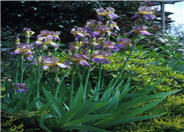
Common name:Crape Myrtle
Botanical name:Lagerstroemia indica
The new leaves of this species are 2" long, bright green, and tinged with bronze. Some cultivars have spectacular fall color. When it has a bare outline, its rounded seed capsules add interest. Its delicate flowers bloom in 6"-12" long clusters. The flower colors could be shades of red, rose, pink, purple, and white, blooming in summer. It thrives on heat, and new cultivars have been created that resist mildew. This tree prefers full sun and has low watering needs once it's established.

Common name:Society Garlic
Botanical name:Tulbaghia violacea
This clumping perennial will grow less than 1' tall and has narrow, blue green leaves. Clusters of lavender flowers bloom in spring and summer. Leaves and flowers have a distinct onion or garlic smell if crushed.

Common name:Verbena
Botanical name:Verbena peruviana
This perennial forms a flat mat that covers an area rapidly. It has dark green leaves with clusters of bright flowers that bloom all year. Hybrids will have a little more height, different flower colors and spread more slowly. It is drought tolerant.

Common name:Gray Lavender Cotton
Botanical name:Santolina chamaecyparissus
This ground cover/small shrub will grow to 3' tall and has small, grayish silver leaves with yellow flowers that bloom in the summer.

Common name:Azure or Russian Sage
Botanical name:Perovskia X hybrid
This broad perennial will grow 3'-6' tall and has small, grey-green leaves with blue-violet flowers that bloom in the summer. Foliage is aromatic if brushed against it.

Common name:Mexican Bush Sage, Mexican Sage
Botanical name:Salvia leucantha
The Mexican Sage is a bushy shrub that grows 3'-4' tall and wide. It has hairy white stems, grey-green leaves and velvet-like purple flower spikes that bloom summer through fall. This shrub tolerates sun, light shade, little water, and is hardy to 15 degrees F. The Mexican Sage attracts hummingbirds. Be careful not to overwater. -Cornflower Farms

Common name:Orange or Brown Sedge
Botanical name:Carex testacea
The testacea variety is an evergreen perennial that reaches 2' tall bearing very narrow, coppery brown leaves splitting to hair-like threads at their tips, and continuing to grow to 4-8' in length. This plant should be grown in sun with little or no summer watering. During winter, foliage turns orange. If this grass is planted in shade, foliage stays green. Flowers are insignificant. Orange Sedge looks great in containers or spilling over near walkways or into water features.

Common name:Powis Castle Artemisia
Botanical name:Artemisia 'Powis Castle'
This mounding shrub reaches 3 ft. high and up to 5ft. wide with fine silver foliage. It does well in coastal areas as well as inland warm areas. It rarely blooms but is used for its beautiful foliage. It is striking next to perennials with bright colors. This shrub prefers full sun and well draining soil. It is drought tolerant once it's established.

Common name:Bearded Iris
Botanical name:Iris Bearded Hybrids
This perennial will grow 1'-3' tall and has medium sized, blue green leaves with flowers of different colors that bloom in spring. It needs well draining soil and full sun. Many are fragrant and rebloom several times a year. Plant rhizomes in Sept or Oct. They need water once a week during the hot spells. Top dress with compost and gypsum in January and August.
Designer: Terri Nichols
Photographer: GardenSoft
Practice grass-cycling by leaving short grass clippings on lawns after mowing, so that nutrients and organic matter are returned to the soil.
Develop healthy soil for plants that are vigorous and naturally pest-resistant.